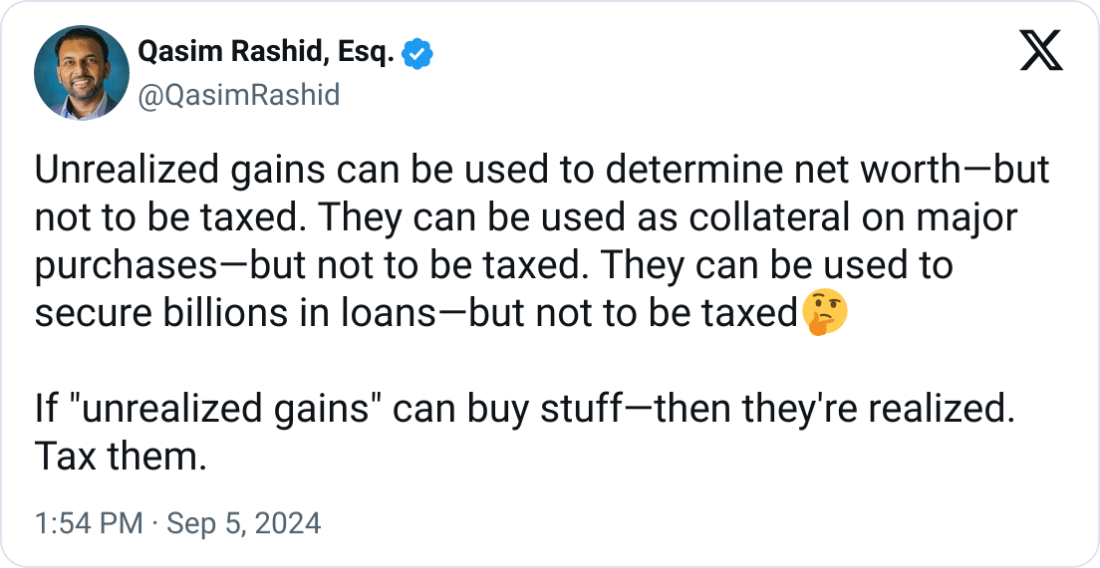this post was submitted on 19 Sep 2024
1601 points (96.8% liked)
Microblog Memes
6142 readers
4644 users here now
A place to share screenshots of Microblog posts, whether from Mastodon, tumblr, ~~Twitter~~ X, KBin, Threads or elsewhere.
Created as an evolution of White People Twitter and other tweet-capture subreddits.
Rules:
- Please put at least one word relevant to the post in the post title.
- Be nice.
- No advertising, brand promotion or guerilla marketing.
- Posters are encouraged to link to the toot or tweet etc in the description of posts.
Related communities:
founded 2 years ago
MODERATORS
you are viewing a single comment's thread
view the rest of the comments
view the rest of the comments

Serious question - who here is in favor of taxing unrealized gains and has more than $20k in personal investments? (Outside of retirement/401k or other tax advantaged accounts)
"The law, in its majestic equality, forbids the rich as well as the poor to sleep under bridges, to beg in the streets, and to steal bread"
-Anatole France
I'm sure the status quo is just dandy to the 10% of Americans that owns 87% of American stocks, and especially the 1% that owns 50%.
The beneficiaries of societal privilege, which ~~earning~~ making money without labor is, will always view anything that makes society more equitable as oppression. This is like seeking out the opinion of business owners on Jim Crow laws in the 50s. You're just looking to confirm your own biases.
I chose the number because it is attainable to the median household with 2 years of saving 20% of their after tax income, but also substantial enough to feel the burden of risk associated with investing. Stocks are not guaranteed income, they are not money for nothing, and changing the playing field affects a lot of regular people just trying their best to build a reasonable amount of wealth, whether to buy a house or secure their financial stability.
I am not close to being a top 10% wealtholder, nor am I related to anyone who is, and I certainly was not expecting to have my investment question compared to complicity in mass racial segregation.
Why does it feel like you pretend people with less than a billion dollars or something in that order of magnitude’s neighborhood in unrealized gains would ever be affected by this legislation?
Laws like these should never affect you unless you’re one of like (I’m guessing numbers) 15 people in your country, so I don’t understand the issue people so often have with them. From my point of view, if we don’t change anything to combat wealth inequality, the most likely outcome is civil unrest (esp. with more climate disasters looming on the horizon)… genuine question, please don’t take it with hostility – I would just like to understand “the other side” here: why would you personally oppose this?
P.S. about to hit 6 (euro)figures invested. ≈50/50 stock/ETF split. But I’m not sure if that truly counts toward your opening question since it’s basically the place for my long-term savings money, but there’s no such thing as regulation for a tax-advantaged “retirement investing” (401k etc.) account here, yet 🙃
Fair question, honestly I think it's 'hacky' and there are cleaner approaches. Regulating unrealized gains stands to cause a headache and costs for those navigating an already very complicated tax system.
To work the implementation would require everyone's assets to be monitored and reported - extra work for tax software, brokers and taxpayers. Plus the development costs to comply with these regulations will be passed onto taxpayers and investors. Yes additional taxes would be recovered but are a drop in the bucket on the scale of the US economy.
To a lesser extent it also discourages regular folk from financial planning since it creates a public perception of "why should I own stock if it's all going to be taxed anyway?" further concentrating influence on institutional and super wealthy investors.
While I'm still undecided on it, the solution others have proposed of regulating borrowing against collateral seems fairer as it puts the onus on the borrower to carry the admin overhead - regular investors remain unaffected.
Now my hot take - I think this is all a distraction from the real problem with the tax system Step up in Basis. If it wasn't for step up in basis the gains would at least be taxed on the investor's death anyway, but right now those who inherit stock get to permanently avoid the taxes on the gains that occurred during the original owner's lifetime (up to a certain limit). I suspect the politicians responsible for passing such legislation would be too directly affected to address that one.